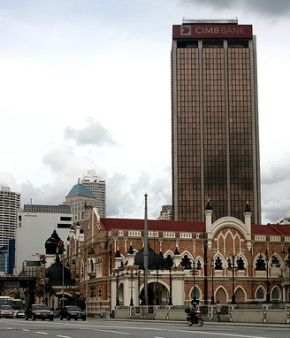
Here are 6 things to blame for CIMB being under pressure
CIMB's high proportion of foreign investors takes its toll on the bank.
According to CLSA, CIMB has had a challenging start to the year, driven by the performance in its wholesale banking business and its Indonesian subsidiary CIMB Niaga.
Here's more from CLSA:
We had been hopeful that for the first time in three years, the bank would be able to deliver on its strategic targets and that there would be opportunities for EPS upgrades.
Instead, we have cut our numbers by 4-5% so far this year. given the economic and political headwinds in Malaysia and Indonesia, management’s decision to tread more cautiously in Indonesia and the drag of RBS, we struggle to see the catalysts for positive surprise in 2H13.
Despite the recent 16% correction in the share price, the risk is skewed to the downside, in our view.
Maybank vs CIMB
Maybank has historically traded at a 20% discount to CIMB. However in recent years this discount has narrowed materially with Maybank currently trading at a more expensive PB than CIMB. This begs the question: do we think this dynamic can reverse in the short term?
We were not surprised when the banks started to trade at similar PB valuations of as of the end of last year given i) the improving fundamentals at MAybank over the past few years
ii) CIMB’s disappointing fundamentals following its acquisition of RBS’ Asia-Pacific cash equities and investment banking business in 2012 iii) the relatively similar ROE profile of 14.3% at Maybank and 14% at CIMB as of 2Q13.
The recent change in dynamics has been driven by the sharp correction in CIMB’s share price since 24 July. CIMB has been under pressure due to:
-
Among the banks, CIMB has the highest proportion of foreign investors. This makes the stock vulnerable to changes in foreign sentiment towards Malaysia. Thus, rising investor concerns about the health of Indonesia’s, Thailand and Malaysia’s macro outlook and the weakness of the ringgit, rupiah and baht has weighed heavily on CIMB’s share price. Sentiment towards Malaysia was not helped by the Fitch outlook downgrade on 30 July.
-
Family ties between CIMB’s CEO and the current Malaysian Prime Minister mean that CIMB is vulnerable to investor concern about political developments. This includes i) the delay of the UMNO party polls (largest political party within the ruling Barisan Nasional coalition) until 19 Oct which may impact investment decisions and/or curb the ability of the government to deliver much-needed austerity measures to curb the budget deficit, ii) speculation of challenges for key government posts, including the UMNO president (who is the current Prime Minister)
-
CIMB’s Indonesian business, CIMB Niaga struggled in 1H13 and the oulook for CIMB Niaga was downgraded on 29 July. CIMB Niaga contributes 31% to CIMB group’s PBT.
-
Turnaround of CIMB Thai remains a slow burn. ROE was 4% in 2Q13.
-
CIMB’s cost-to-income ratio has continued to rise since the end of 2011, putting pressure on the group’s underlying ROE. The cost-to-income peaked in 2Q13. CIMB subsequently acknowledged that the RBS acquisition, which is 5% of group costs, may not break even in 13CL.
-
Given macro and political headwinds, the bank acknowledged during its 2Q13 results on 26 Aug that it is at risk of missing its annual targets for the third year in a row.
We have already acknowledged that Maybank has its own challenges but between the two, Maybank’s issues are not as acute. Thus, it will be challenging for CIMB to alter its relative underperformance versus Maybank in the near term.






















 Advertise
Advertise








